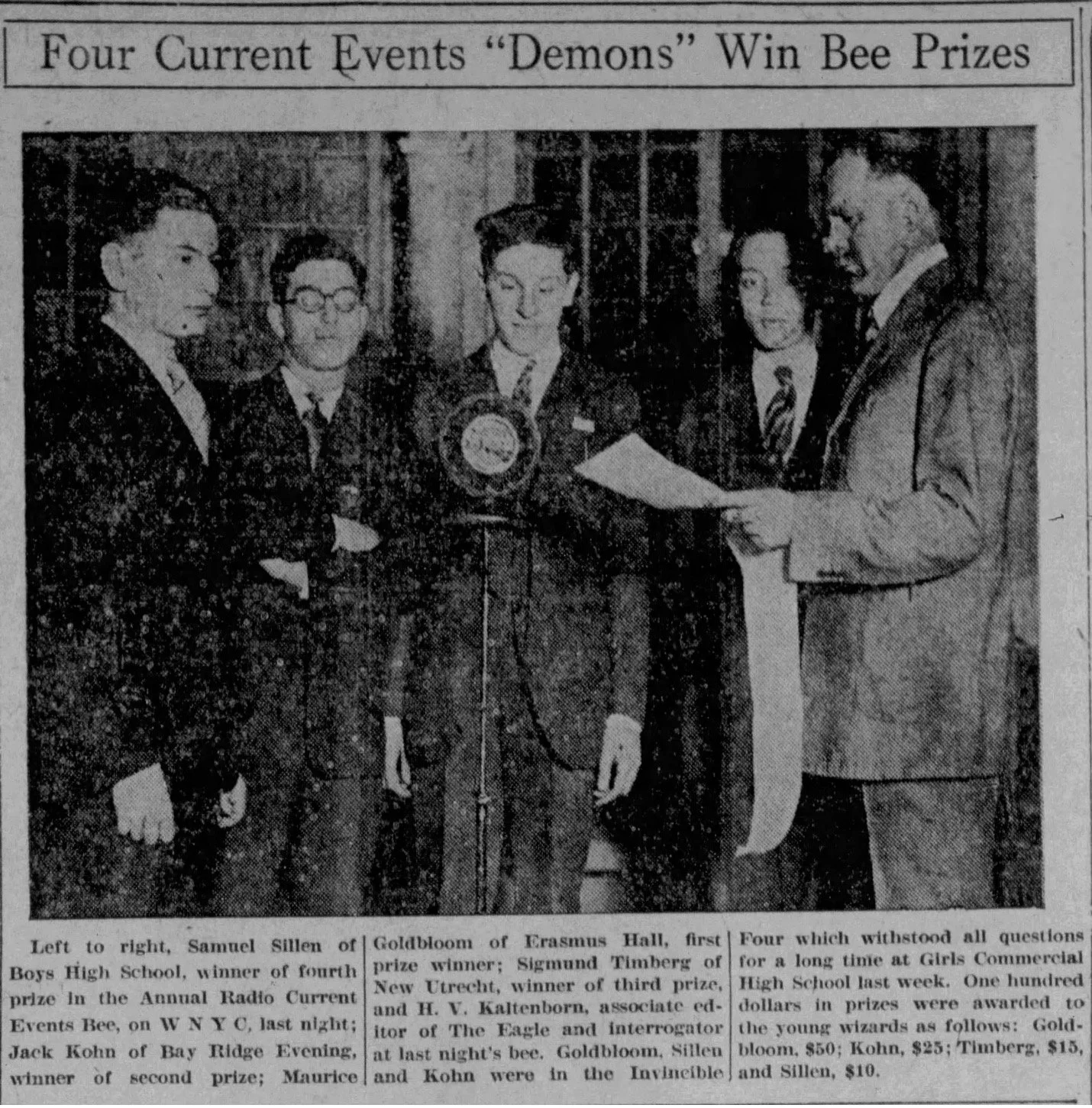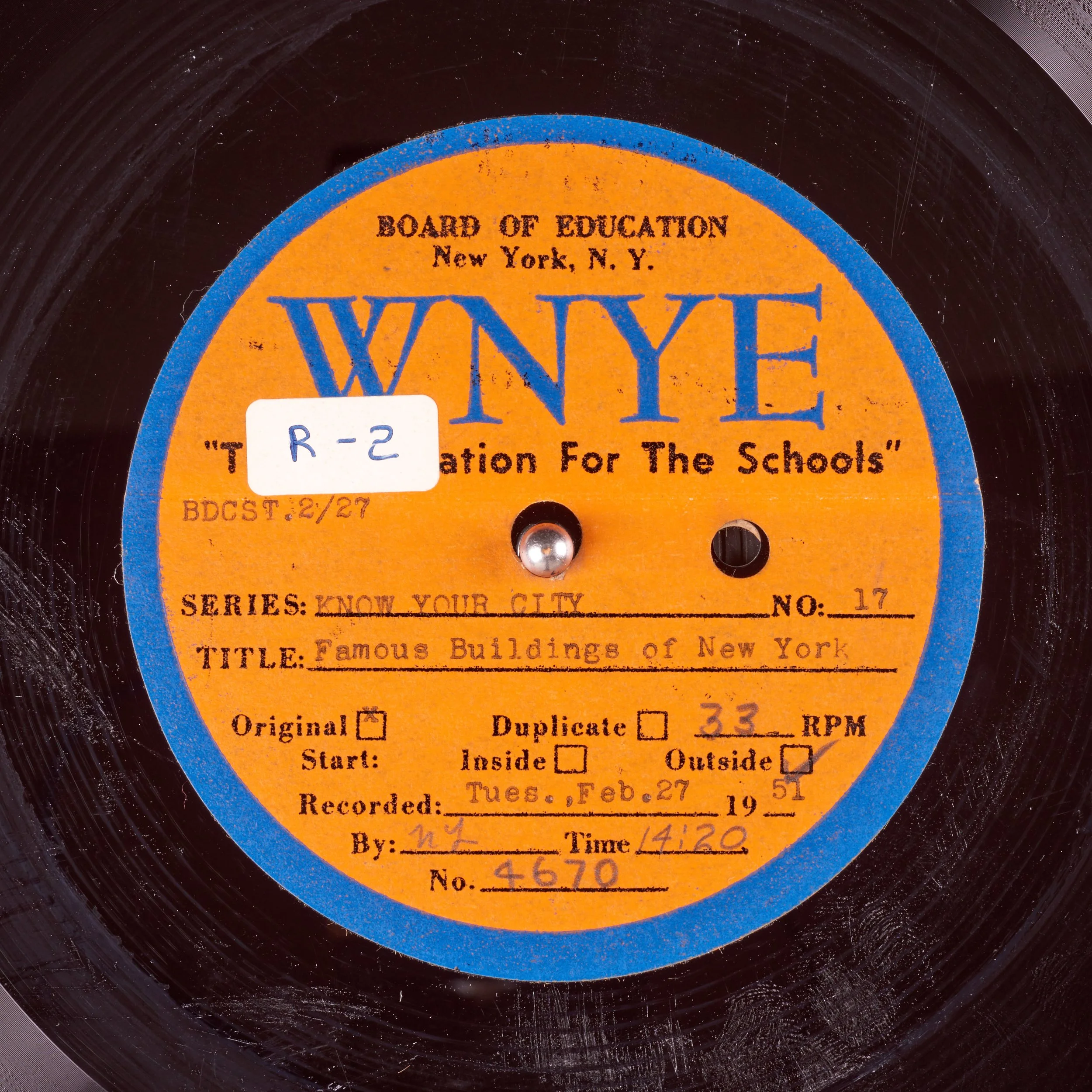The Municipal Archives’ upcoming trivia night reminds us that New York City has long used questions—and the thrill of answering them under pressure—to engage, educate, and entertain the public. Decades before televised quiz scandals or the high-stakes glitz of commercial networks, WNYC and WNYE were using the question-and-answer format, helping to define one of radio’s most popular genres during its so-called “golden age.” But unlike commercial broadcasters, the city stations used these contests of knowledge and recall as a powerful tool for civic understanding and cultural enlightenment.
H.V. Kaltenborn at Town Hall, 123 West 43rd Street, January 27, 1934. Photograph by Eugene de Salignac, Department of Bridges/Plant & Structures Collection, NYC Municipal Archives. Brooklyn Daily Eagle editor H. V. Kaltenborn started radio’s first quiz show on WNYC, before going on to a long career in broadcasting.
Early Experiments: The 1920s and 1930s
More than ten years before CBS introduced Professor Quiz in 1936 (popularly regarded as first of the genre), WNYC aired the Brooklyn Daily Eagle’s annual Current Events Bee, a competition that pitted leading high-school students against each other in feats of news knowledge. The Bee’s quizmaster, associate editor H. V. Kaltenborn, would later become known nationwide as the “Dean of Network News Commentators.”
Four Current Events “Demons” who won prizes on WNYC, Brooklyn Daily Eagle, April 24, 1926 pg. 5, Brooklyn Public Library Collection.
Brooklyn Daily Eagle Current Events Bee medal from the 1920s. NYPR Archives Collection.
Twelve years later, WNYC inaugurated what is widely recognized as radio’s first music quiz show, Symphonic Varieties. The program arose almost by accident: a last-minute Saturday cancellation left announcer and drama director Ted Cott scrambling to fill two hours of airtime. He gathered five staff members, jotted down a dozen music questions, and launched an impromptu quiz that immediately drew enthusiastic listener mail. Cott refined the idea into a successful weekly contest pairing a professional musician against a knowledgeable amateur, accompanied by plentiful musical excerpts.
The show attracted notable talent. A young Jonathan Sternberg, later an internationally known conductor, scripted roughly 200 episodes, crafting both questions and correct answers. In January 1939, NBC’s famed “tune detective” Sigmund Spaeth filled in as host. One young contestant—future WNYC and WQXR classical host David Randolph—was encouraged by Spaeth to stick with radio, advice that shaped Randolph’s lifelong broadcasting career.
Cott eventually took the program to CBS, where it was rebranded as So You Think You Know Music.
Art, Culture, and Civic Knowledge
WNYE Know Your City radio transcription disc label, 1927. WNYC collection, NYC Municipal Archives.
In February 1939, the Brooklyn Museum sponsored Art for Art’s Sake, a quiz devoted entirely to painting, sculpture, dance, drama, literature, and architecture. It premiered in WNYC’s largest studio before moving to the museum’s auditorium. Winners were said to receive works of art, although Brooklyn Eagle radio columnist Jo Ranson assured readers that no Rembrandts or Botticellis were being handed out as prizes.
That same year, the WPA’s Federal Writers’ Project joined the wave with Quiz of the Town, airing weekly over the city’s station from the New York World’s Fair. Designed to deepen New Yorkers’ knowledge of their city, the contest drew questions from the WPA’s New York City Guide and similar works. Early contestants included journalists covering the Fair, and winners received a copy of the 800-page guide.
Educating Young New Yorkers: Know Your City
Beginning in 1943, WNYC and WNYE collaborated with the City History Club of New York to launch Know Your City, a weekly children’s quiz on local history, civics, geography, and landmarks. The program was hosted by Edith McGinnis, affectionately known on the air as “Aunt Edith,” who would later become Manhattan’s first borough historian (1950). She viewed the program as an extension of classroom instruction, a way to instill civic pride through lively competition.
In 1945, the Schools Broadcast Conference recognized Know Your City for “outstanding excellence” and “superior educational application.” Listen here to Aunt Edith with kids from P.S. 8 and P.S. 166 on this February 27, 1951 edition.
Postwar Variety and Innovation
At the end of May 1949, WNYC introduced Mind Over Music, with conductor and violinist Mishel Piastro, composer George Kleinsinger (Tubby the Tuba), pianist Seymour Lipkin, and NYU music professor Phillip James as panelists, and John Savage as host. Variety praised the program’s range—from grand opera to Broadway, classics to folk songs—and its mixed format of panel questions and individualized challenges.
Listen here to panelists Walter Hendl, former Assistant Conductor of the New York Philharmonic, Vernon Duke, composer of Cabin in the Sky, and WNYC’s “shoeless troubadour” Oscar Brand at the end of August 1949.
During the early 1950s, quiz programs became staples of WNYC’s annual art and book festivals. The first book festival in March 1953 featured a literary Q and A moderated by critic and editor Clifton Fadiman, with a panel of authors, reviewers, and academics that included: “The Critics”—Charles Poore of The New York Times Book Review paired with Columbia University Professor of Philosophy Irwin Edman—against “the Authors”—Alfred Kazin of The New Yorker, and Jan Struther, of “Mrs. Miniver” fame—in a battle over various literary facts. The Critics won.
Civil Service on the Air: Quiz Time
In October 1954, public service became a subject for public competition on Quiz Time, a weekly show featuring teams of city employees from sixteen different departments. Hosted by the Department of Personnel’s Dr. John Furia, the premiere matched Welfare Department staff (a stenographer, interviewer, and investigator) against a fireman, truckman, and fire-boat lieutenant from the Fire Department. Questions escalated from basics—the colors of the city flag, the rivers surrounding it—to thornier queries about how the opposing agency functioned.
Mayor Robert Wagner, introducing the program, described it as a way to show “how the thousands of loyal employees of the city are serving you.” Variety called it “a pleasant vehicle for transporting incidental intelligence about home.” Here, the Department of Budget goes head-to-head against the Department of Correction in May 1954.
A Transforming Genre Transformed
From music and art contests to citywide tests of civic knowledge, WNYC and WNYE’s quiz programs reveal far more than a fondness for trivia. They reflect a philosophy of public broadcasting rooted in curiosity, community, and democratic participation. Long before podcasts or online quizzes invited audiences to “play along,” New York’s municipal stations understood that asking questions was a powerful way to spark interest—whether in classical music, fine arts, local history, or the day-to-day workings of city government.
These programs also underscore the unique role that the city’s radio stations played in mid-century New York culture. Unlike network quiz shows driven by sponsors, prizes, and ratings, WNYC and WNYE’s contests were designed to illuminate rather than sensationalize. They offered New Yorkers a forum in which learning was not merely entertainment but a civic virtue—something shared among students, musicians, museum curators, firefighters, welfare investigators, and anyone tuned in at home.
Although the quiz-show scandals of the late 1950s reshaped public perception of the genre, the municipal station’s earlier efforts stand apart. They belonged to a different tradition: one that celebrated knowledge without cash incentives, showcased the talents of city workers, encouraged children to explore their neighborhoods, and invited listeners to see culture and government as accessible parts of daily life.
In revisiting these programs—from Symphonic Varieties to Know Your City and Quiz Time—we are reminded that the simple act of posing questions can knit a community together. WNYC’s legacy of inquiry lives on not only in modern trivia nights but in the station’s continued commitment to public service broadcasting. The history of these quiz shows offers an instructive window into how New York once educated and entertained itself—one question at a time.
Test Your NYC Knowledge at the NYC Department of Records and Information Services’ Second Annual Trivia Night!
Do you know which Brooklyn thoroughfare was the location of the nation’s first bike lane? Or how many U.S. presidents were born in NYC? Or which hip-hop group from Staten Island helped put “Shaolin” on the musical map?
Whether you’re a native New Yorker, new to the Big Apple, or simply love trivia, join us for an exciting evening of fun, facts, and friendly competition at our second annual NYC history trivia night!
Test your knowledge of the city’s rich past and unique records, with questions highlighting everything from iconic moments to forgotten landmarks in New York City’s history. This is your chance to show off your smarts, bond with friends, and maybe learn something new along the way!
Date: Tuesday, December 2nd, 2025
Time: Doors Open at 6:00PM; Trivia begins at 6:30PM
Location: Surrogate’s Courthouse, 31 Chambers Street, New York, NY 10007
Teams:
Teams of up to 5 are welcome!
Already have a team? Great! All teammates must register individually and indicate the team captain’s name.
Coming solo or with just a few friends? No problem! You can compete on your own or we'll happily match you with other trivia lovers on the night of.
Prizes:
The top two teams will take home some fantastic prizes!
Spots are limited, so don’t wait—reserve your spot today!
To RSVP for “Trivia Night at the Municipal Archives & Library,” click here.



